
Additional Curricula Recommendations
In The Well-Trained Mind, we offer our “top” recommendations for curricula: those that combine academic excellence, ease of use for the parent, clarity, and (when possible) affordability. But there are many books, programs, and resources that are compatible with the goals of classical education–even though we may have found them unnecessarily complicated, hard to find, overpriced, specialized, or quirky to list in the book itself.
The recommendations listed here are only a few of the many available. Visit our forums for even more suggestions.
Wondering about the latest edition of The Well-Trained Mind? Here, Susan walks through the updates and changes you’ll find in the fourth edition:
Additional Curricula Recommendations By Subject
Additional Curricula Recommendations By Stage



Below, you’ll find an updated list of resources recommended in the fourth edition of The Well-Trained Mind that have changed in their format or availability. If you’ve discovered others, please email us at [email protected]!
DATE: December 20, 2016
RESOURCE: Latina Christiana II (page 233)
CHANGE: This product has been discontinued by the publisher, Memoria Press. Memoria now recommends that you progress straight from Latina Christiana I into First Form Latin (as recommended on p. 489 as an alternative path; it’s now the only path).



The Well-Trained Mind: A Guide to Classical Education at Home has gone into its fourth edition! Here’s a list of the major differences in this most recent revision.
- Each chapter has been separated into two sections: first, how to teach a subject (methods, goals, expectations, etc.); and second, what resources to use (recommended texts and curricula.) This makes the book even more flexible, since parents can use the principles of teaching even if they choose to use other specific texts or programs than the ones we suggest.
- Completely updated book and curricula recommendations.
- New guidance on dealing with learning challenges and difficulties. Children who struggle with learning disabilities seem to make up a much higher percentage of home educated students than in previous years, since schools often are unable to provide the support they need. As home education has become more visible and additional resources have become available, many more parents are reacting to these very individual needs by choosing to remove struggling children from the classroom entirely.
- New online resources, including alternative curricula (not included in the book because they were too complicated, expensive, specialized or quirky—but all of which have enthusiastic support among many veteran home schoolers), additional help for struggling learners, apps and online learning games, and more.
- Brand-new maths and sciences chapters. Classical education has often been criticized as stronger in the humanities than in the maths and sciences. Working with highly qualified experts and experienced teachers, we have overhauled our approach to provide a much more rigorous and coherent maths and sciences education.
- Shift of quickly outdated appendices (list of suppliers and publishers, index of home education organizations, links to state laws, and other constantly changing resources) online, where they can be regularly updated.
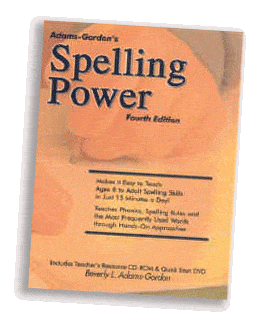

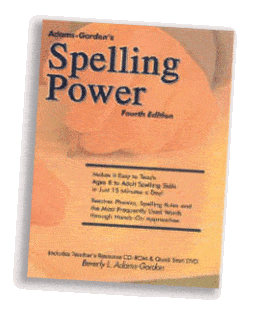
Subject: Spelling
Grade level: 3-12
Publisher: Castlemoyle Books
Website: http://www.spellingpower.com/
Description: This one-volume spelling resource, recommended in earlier editions of The Well-Trained Mind, is designed for use in any grade (third and after). Rather than taking a workbook approach to spelling, Spelling Power is list-focused; it divides a list of 5,000 words (“most frequently used and misspelled by children and adults”) into eleven levels, based on frequency of use, and then further separates those levels into groups by phonetic principles. Students are taught to visualize and trace words in the air before writing them; a selection of games and activities expand the method to include the other senses. The parent needs to spend preparation time on the lesson before teaching it.
Pros: Affordable, multi-sensory.
Cons: Requires more preparation time than Spelling Workout but provides less detailed instruction than All About Spelling or Sequential Spelling.
Why it’s not in the book: Spelling Power is still a good resource, but All About Spelling and Sequential Spelling are more complete programs for dyslexic and spelling-challenged students, while Spelling Workout is simpler to use for students who don’t struggle with spelling. Spelling Power “falls in the middle.”
What parents say: Visit these legacy forum threads to find out more, or register as a forum member to ask your own questions and get more up-to-date responses.
https://forums.welltrainedmind.com/topic/452897-spelling-power/
https://forums.welltrainedmind.com/topic/88612-spelling-workout-vs-spelling-power/
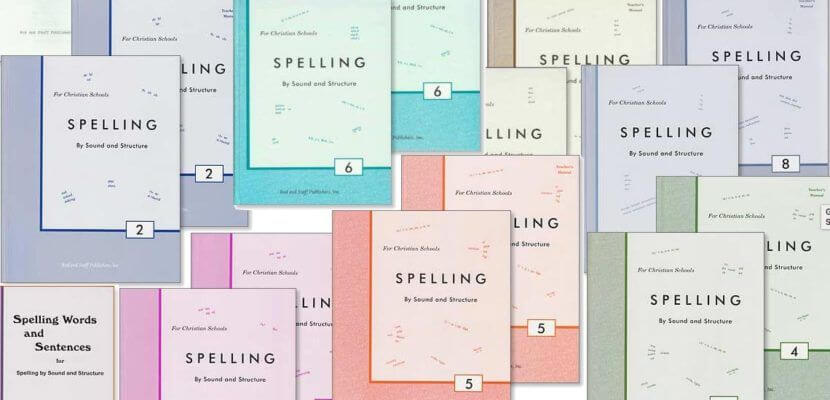
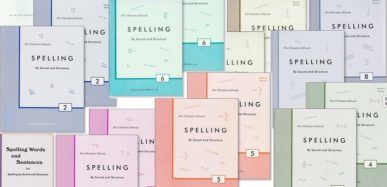
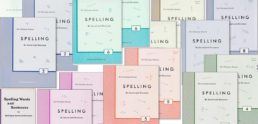
Subject: Spelling
Grade level: 2-8
Publisher: Rod & Staff
Website: https://www.milestonebooks.com/list/Rod_and_Staff_Spelling
Description: Spelling by Sound and Structure progresses, over seven levels, from phonetic spelling rules, through exceptions and word roots and prefixes, concluding with word study. Word lists for each lesson are primarily organized around phonetic principles. The program consists of a student workbook and a teacher manual for each level; the workbook contains consumable worksheets, while the teacher manual tells the instructor how to present the principles underlying each list (“Point out that swim is a one-syllable word having a short vowel sound and ending with only one consonant. For most words like this, the final consonant is doubled before adding a suffix that begins with a vowel…”). Most lessons have three parts; in Parts A and B, the student reviews the meaning of each word on the week’s list and learns the phonetic principles underlying each list; Part C teaches an associated skill (alphabetizing, dictionary skills, building compound words, etc.).
Pros: Affordable (each student/teacher set is less than $20), thorough and phonetically sound, straightforward (as long as you have some basic phonics knowledge, the lessons will be very clear), and no-frills (can be completed without expensive supplements and very little prep time).
Cons: Heavy scriptural content; requires lots of handwriting, so not suitable for younger students or those with fine motor delays; very traditional print-centered approach, not suitable for students who need more multi-sensory teaching.
Why it’s not in the book: Designed for the classroom, not for home educators (lots of instructions geared towards group teaching); very similar approach to the Spelling Workout program recommended in The Well-Trained Mind; heavily Mennonite orientation makes it unsuitable for many families.
What parents say: Visit these legacy Well-Trained Mind Community threads to find out more. You can search for more up-to-date posts, as well, and if you become a member, you can ask for more responses.
https://forums.welltrainedmind.com/topic/554650-tell-me-about-rod-staff-spelling/
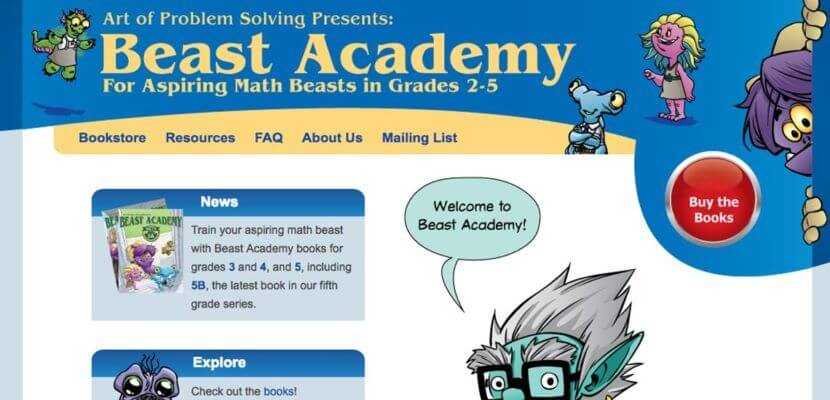
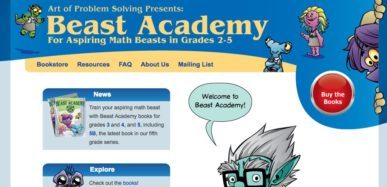
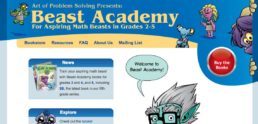
Subject: Mathematics (arithmetic)
Grade level: Elementary and early middle school (grades 2-5)
Publisher: Art of Problem Solving
Website: https://www.beastacademy.com/
Description: Beast Academy is a conceptual math program intended to cover arithmetical topics (according to the publisher, it is “loosely based on the Common Core standards”) The program is written in comic book style, with plenty of problems and an online component, and is intended as a full math program (not a supplement).
Beginning with arithmetical problems, Beast Academy moves (by grade 5) into some pre-algebraic material. Like the upper-level Art of Problem Solving materials, Beast Academy operates by giving students problems to solve without a great deal of initial instruction, guiding them into learning as they wrestle with unfamiliar material.
Pros: Beast Academy is strongly conceptual and encourages mathematical thinking (as opposed to formulaic problem solving) at an early age. The program is designed to produce a high level of mathematical achievement at an early age, and is excellently suited to STEM-gifted students.
Parents of dyslexic children have found Beast Academy (and the AOPS approach generally) well suited to students who struggle with processing written information.
Cons: Many parents have observed that the program is designed for children who process mathematical information quickly (and relatively easily). Although it can be used with slower maturers, it is likely to frustrate many children working at the grade level indicated by the book titles.
The cartoonish, comic-book style is annoying to some learners, and the core books are visually “busy” and distracting.
Why it’s not in the book: Several reasons.
As of publication of The Well-Trained Mind in August 2016, the program was not complete through the end of Grade 5, but it is now, as of 2021.
The program introduces “higher level” (abstract and algebraic) thinking at a very early stage. Although many young students will prosper with this challenge, in our opinion, the majority of math students will not be ready for the logic- and even rhetoric-stage skills introduced during grammar- and early logic-stage studies.
Generally, Beast Academy does not hold to our preferred model of grammar-stage instruction; it is strongly whole-to-parts.
What parents say: Visit these legacy forum threads to find out more, or become a member of the forums to ask your own questions.
https://forums.welltrainedmind.com/topic/564411-how-do-you-use-beast-academy/
https://forums.welltrainedmind.com/topic/358380-the-official-beast-academy-review-thread/
https://forums.welltrainedmind.com/topic/515300-didnt-like-beast-academy/







